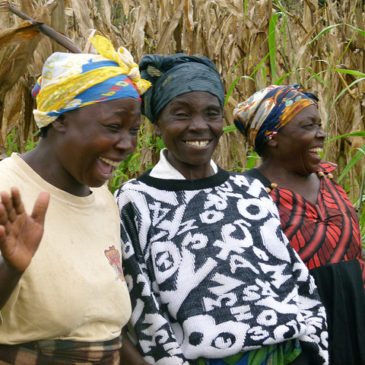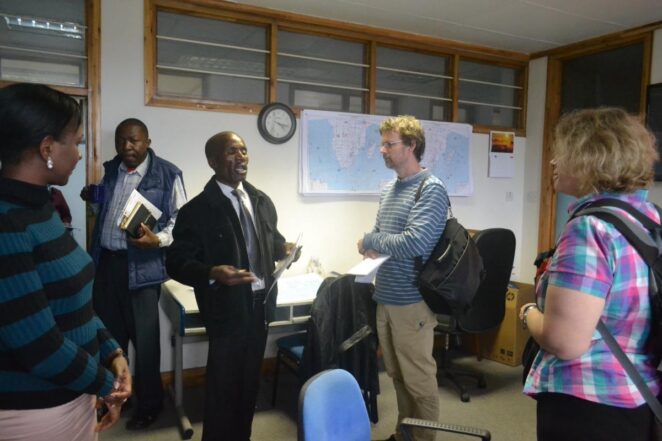Co-producing climate knowledge – Great in theory, but how about practice?

This blog was written by Estelle Rouhaud, Research Project Manager at the Grantham Research Institute and for the FCFA UMFULA consortium. It originally appeared on Future Climate for Africa‘s website on 12 Feb 2018: http://www.futureclimateafrica.org/news/co-production-aspiration-and-reality/
Introduction
Some call it a buzzword, others an aspiration. I became familiar with the concept of co-production when I first joined the London School of Economics a few years ago. The words “co-production” and “impact” are a constant chorus for those engaged in social science research in the UK. Today, if one wants to have a chance to win new research funding, going through the co-production exercise becomes almost automatic. In a large research programme on climate resilience that I am involved in, the Future Climate for Africa UMFULA project, co-production is also something that we are genuinely trying to do, but battling with.
Co-production has been going on for years; a quick web search will show you that. Researchers have written about it many times to try to define it and give recipes for success. Yet, it seems that there is still a long way to go.
So what is co-production?
Confusion about co-production is real, as evidenced by the many definitions you can find in the literature. Co-production is not the simple dissemination of the research. It is not about knowledge transfer either. Co-production goes ‘both ways’, with no hierarchy involved. This perhaps is one of the biggest challenges the research community has to accept to make it work.
A participant at a recent workshop on co-production in resilience (“The impacts of co-production in resilience building: Reviewing the role of research” hosted by King’s Colllege London) helpfully gave us the definition settled on by the BRACED programme: ‘Co-production is the bringing together of different knowledge sources and experiences from across different disciplines, sectors and actors to jointly develop new and combined knowledge’.
Another definition from Bev Holmes in an LSE blog which I find quite useful for two reasons. First, its use of the word ‘stake’, and second, for its pragmatism on what co-production means in practice. She states that co-production is ‘the collaboration between researchers and others with a stake in a project in its governance, priority-setting, conducting of research, and knowledge translation’.
Our sister project, the FRACTAL team, also have a good definition that highlights the end goal and the tension between the different actors involved: ‘knowledge co-production involves the combining of two or more different types of knowledge, skills and working practices by bringing together people who think and act in often very different ways in order to create new knowledge for addressing societal problems of shared concern and interest’.
In short, co-production is…
- A new method of knowledge production
- A collaboration of different groups of people (e.g. researchers, decision-makers) on an equal basis
- A process that needs to be ethical, inclusive, adaptable, flexible and long-term
- A process that aims to address societal problems of shared concern and interest
What does co-production mean in practice?
Co-production is a process which takes time. It starts from the very beginning of a project, at the design stage, and carries through to implementation.

Many in the co-production for climate resilience workshop argued that one of the biggest limitations of co-production is the funding model. How can policy-makers and practitioners feed into the design of a project if agendas are set by the funding priorities and rules of donors?
To that, I would add, how can we secure a sustained and trusted relationship between researchers and stakeholders if co-production is limited to the short lifecycle of a funded project? What can researchers do when funding ends and they quickly have to move on to their next project and sometimes their next set of stakeholders? What I’ve seen is organisations coming together because of funding, but, as I heard last week, ‘behind the scenes, there is a risk of business as usual’.
weADAPT hosts a variety of articles related to co-production and co-exploration.
- Read more about co-production:
- Read this guide on how to establish transdisciplinary learning processes and co-production of knowledge.
What are the barriers to co-production?
Besides the funding model, another issue is the incentives system for co-production. In an academic environment, researchers, and in particular the ‘early career’ ones, will often have to decide between spending time writing research papers and doing co-production. Both are time-intensive, but only the former is the true benchmark for career progression and promotion. This is not confined to the UK. Speaking with UMFULA colleagues from Africa, it appears quite widespread. Things are changing slowly in the UK with the Research Excellence Framework taking into account the ‘impact beyond academia’, and the new Knowledge Exchange Framework aiming to translate knowledge ‘into practical uses’. What more can be done to recognise and institutionalise co-production?
To convince researchers that co-production is worth the effort you have to prove the causal effect between effort and result. If you are lucky you sometimes have clear proof to show. However, the reality is that measuring resilience outcomes is a real challenge and attributing impact to a specific project is almost impossible, when many other programmes operate in the same study region or external socio-economic changes may influence outcomes.
On the other side, stakeholders also have to find a benefit if they embark on the co-production adventure. In the contexts where UMFULA works, staff resources and capacity are limited and already under pressure from demands by researchers, NGOs, donors and consultants, to join projects, attend workshops, express their needs and share information. Research projects such as UMFULA have to show how co-production is less extractive and of mutual benefit to all parties involved.
In short, barriers to co-production include…
- Current funding models that impede the involvement of stakeholders in research design and also makes the collaboration short term
- An incentives system within academia that favours traditional ways of doing research
- Excessive demand on stakeholders who face capacity issues and competition for involved in research projects
- Proving that co-production leads to intended outcomes
Successful co-production requires identifying benefits for all participants. It is also key to manage expectations to avoid mistrust: be clear on what each party will gain from the collaboration. This requires defining roles early on in a project. You should also have a flexible, adaptable and iterative process for co-production, being open to formal and informal methods of engagement and regular review of activities and process. You should also ensure that a co-production process builds on previous knowledge and research. Design a co-production process to ensure it is long-term and sustainable, by ensuring local ownership of the knowledge and engaging institutions as well as individuals. Sustainability also involves a different funding model, one with a longer life cycle of funding and one where stakeholders are engaged in the research design process. Finally, an ethics and principles framework is essential to govern co-production projects.
How to make co-production work?
Above all, while each context is different, what is clear is the need to review which approaches have been useful, share best practice and act on the learning to create a real culture of learning. ‘How many times are we going to re-invent the wheel?’ one participant at the workshop co-production in resilience asked. Learning should be for everyone: researchers, on how to co-produce impactful research; stakeholders, on how to work together with researchers to tackle societal challenges; knowledge brokers, on helping to share information between researchers and stakeholders; and funders, on how to structure programmes and funding to support co-production.
Have we ever seen co-production?
We’ve certainly seen many attempts at co-production. UMFULA works with various stakeholders in Malawi and Tanzania to co-produce climate and impact information that is relevant for long-term decision-making for water management and agricultural sectors. While the co-production process is not straightforward, we believe it will lead to more sustainable outcomes for the benefits of the people on the ground.
More will emerge from the FCFA programme on co-production, so stay tuned. In addition, you can also read more about co-production to build resilience and produce climate services through the BRACED and WISER programmes.
Related resources
- See the original blog on CDKN's website
- See the reposted blog on CDKN's website
- Learn more about the FCFA UMFULA project - Uncertainty reduction in models for understanding development applications
- Go to the UMFULA website
- Read 'Africa's Climate: Helping decision-makers make sense of climate information'
- Building resilience in southern African cities
- Receptivity and judgement
- Co-producing climate knowledge
- Tearing down the ivory tower
- Co-producing climate information for Windhoek decision making
- A guide to Effective Collaboration and Learning in Consortia
(0) Comments
There is no content